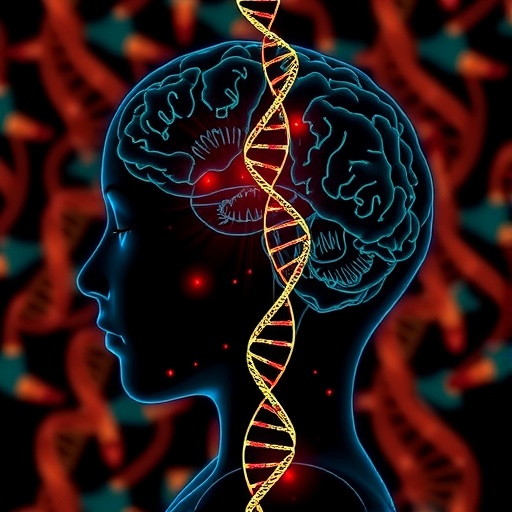In a groundbreaking study published in Nature, researchers have unveiled the profound impact of rare genetic variants on the risk of developing Attention Deficit Hyperactivity Disorder (ADHD). This large-scale genetic analysis provides compelling evidence that rare coding mutations are substantial contributors to ADHD’s heritability, shedding new light on the complex genetic architecture underlying this pervasive neurodevelopmental disorder. The findings mark a pivotal step toward unraveling the biological mechanisms driving ADHD and hold promise for future therapeutic targets.
ADHD, characterized primarily by inattention, hyperactivity, and impulsivity, affects approximately 5% of the global population. Despite its prevalence and significant societal burden, the precise genetic factors that underpin ADHD have remained elusive. While genome-wide association studies (GWAS) have identified common variants associated with ADHD, these explain only a fraction of its heritability. The current investigation dives deeper by focusing on rare, potentially more deleterious variants, broadening our genetic understanding of the disorder beyond common polymorphisms.
Utilizing extensive genetic sequencing data, the research team classified rare variants into two principal categories: class I variants, which are likely protein-truncating and presumed damaging, and class II variants, which are missense variants predicted to be damaging. Their analysis revealed that class I variants alone account for approximately 2.5% of ADHD’s heritable variance on the liability scale, a statistically significant finding supported by a standard error of 0.7%. In stark contrast, class II variants were found to contribute a more modest 0.1% heritability, highlighting the heterogeneous effect sizes of different types of rare mutations.
Intriguingly, when individuals with comorbid intellectual disability (ID) were excluded from the dataset, the burden heritability of class I variants decreased to 1.43% (with a standard error of 0.74%), underscoring the genetic interplay between ADHD and intellectual disability in some cases. This nuanced insight suggests that while rare variants confer elevated risk to ADHD, the presence of comorbidities intricately influences estimates of genetic contribution and warrants careful phenotypic stratification in genetic studies.
The study’s heritability estimates resonate intriguingly with observations in other neuropsychiatric disorders. For example, burden heritability from rare coding variants in schizophrenia and bipolar disorder stand at 1.7% and 1.8% respectively, indicating a shared genetic burden across these neurological and psychiatric conditions. This parallel adds weight to the theory that rare genetic variants affecting neuronal biology are common drivers of diverse psychiatric phenotypes, though manifesting distinct clinical outcomes.
Crucially, the research dispels potential confounds by showing that rare synonymous variants, which do not change the amino acid sequence of proteins, exhibit no significant burden heritability for ADHD. This finding reinforces the notion that functional alterations at the protein level, rather than neutral mutational noise, contribute substantially to ADHD’s genetic risk. Such distinctions refine the targets for future functional validation and genetic screening efforts.
Delving deeper, the analysis pinpointed three genes — MAP1A, ANO8, and ANK2 — as harboring class I rare variants that collectively explain about 5.2% of the class I burden heritability. These genes are intimately involved in neuronal function and offer valuable avenues for mechanistic studies. MAP1A has known roles in microtubule assembly essential for neural integrity, ANK2 codes for ankyrin proteins implicated in neuronal stability, and ANO8’s functions are emerging but potentially tied to ionic regulation in neurons, highlighting the involvement of diverse molecular pathways.
This relatively small genetic set elucidates only a fraction of the burden, implying that numerous undiscovered ADHD risk genes remain concealed within the human genome. The vast unexplored territory of rare variant genetics poses an exciting frontier for further research, potentially revealing novel molecular circuits and therapeutic targets for ADHD and related disorders.
Beyond the primary genetic discoveries, this research exemplifies the evolving utility of rare variant burden analysis in psychiatric genetics. By employing advanced sequencing technologies and refined statistical models, the study transitions beyond traditional GWAS to capture the influence of ultra-rare, high-impact mutations, which collectively bear substantial clinical significance. Such methodologies pave the way for improved personalized risk prediction and precision medicine approaches.
Moreover, the results prompt a reconsideration of ADHD as a genetically heterogeneous disorder, where both common polygenic backgrounds and rare, potent variants converge to shape the phenotype. This dual genetic architecture echoes patterns found in other complex diseases, emphasizing the need for integrative genetic analyses that span allele frequencies and effect sizes.
The implications extend beyond mere genetic counseling or risk prediction. Gaining a molecular foothold into ADHD’s biology can spur the development of targeted interventions that modulate neuronal pathways affected by deleterious mutations. Such precision therapies could revolutionize ADHD treatment paradigms, currently dominated by symptomatic management.
In summary, this seminal study reveals that rare coding variants significantly contribute to ADHD risk, implicating neuronal biology with overlapping genetic features shared by other psychiatric disorders. The discovery of key genes and quantification of burden heritability refine our understanding of ADHD’s genetic landscape, representing a leap forward in psychiatric genetics and offering hope for novel diagnostics and therapeutics.
As research continues to unfold, the integration of rare variant data with transcriptomic, epigenomic, and clinical datasets will be critical to convert genetic insights into actionable medical advances. This study sets a foundation upon which future investigations will build, illuminating the intricate genetic mosaics shaping neuropsychiatric health.
Subject of Research: Genetic contribution of rare variants to Attention Deficit Hyperactivity Disorder (ADHD).
Article Title: Rare genetic variants confer a high risk of ADHD and implicate neuronal biology.
Article References:
Demontis, D., Duan, J., Hsu, YH.H. et al. Rare genetic variants confer a high risk of ADHD and implicate neuronal biology. Nature (2025). https://doi.org/10.1038/s41586-025-09702-8
Image Credits: AI Generated
DOI: https://doi.org/10.1038/s41586-025-09702-8
Keywords: ADHD, rare genetic variants, heritability, neuronal biology, genetic burden, class I variants, class II variants, MAP1A, ANK2, ANO8, neurodevelopmental disorders, psychiatric genetics




